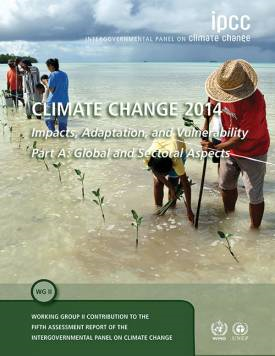May 5, 2015 – For those who short change the reports that the Intergovernmental Panel on Climate Change (IPCC) have issued in the last couple of decades, there are some statistics that might be of interest to you. In the latest assessment, the fifth, 1,217 authors from 92 countries were nominated by their respective governments. In the end 436 contributed from 54 countries.
The report contains more than 12,000 cited scientific references including journal papers, studies and metadata analyses. 1,729 experts in 84 countries, including natural and physical scientists, engineers, social scientists and others nominated by their governments, reviewed all drafts contributing more than 50,000 comments. Final acceptance involved a line-by-line review of the summary for policymakers from all 195 participating countries.
In addition to the formal document that included technical assessments and observations, plus the summary for policymakers, they included a section dedicated to FAQ, frequently asked questions. The questions are worth reading because they express some of the confusion that many have in trying to understand the difference between climate and weather, mitigation and adaptation, and other issues. Each answer in the FAQ section is cross referenced to content to be found in the technical assessments but the summary responses are insightful to read. One in particular stands out. It is a response to FAQ 5 which asks “Can science identify thresholds beyond which climate change is dangerous?”
I cite a portion of the response which states “while science can quantify climate change risks…based on the probability, magnitude and nature of the potential consequences of climate change, determining what is dangerous is ultimately a judgment that depends on values and objectives.”
Hence the question “what next?”
Are all nations committed to carbon reduction after all?
Governments like Australia, and Canada, seem to suffer from tunnel vision on the issue, more worried about extracting fossil fuels and shipping them to overseas markets, then the consequences of the burning of those fuels.
Are they alone in their indifference?
Some nations, like India, are put off by the latest assessment because developing nations are lumped in with the Developed World as net contributors to the carbon problem, not based on a per capita contribution but on the total amount of greenhouse gases which loads the dice against the former’s further development. India, right now has made a pledge to decrease emission intensity per population by 20 to 25% from 2005 levels by 2020. But overall emissions continue to climb.
Does that mean India will bug out or participate at Paris in December?
The Paris meeting is all about a global commitment to carbon reduction giving nations some leeway on putting their own spin on what that actually entails. Once a deal is concluded it will be important to know that a mechanism is in place to address “what next?”
Here are just a few of my immediate questions for the 195 country leaders who will gather in December.
- What will be the measuring standard for carbon reduction and who will be the governing agent overseeing the global response?
- Which will be the preferred global method for carbon pricing, a tax, cap and trade, or a bit of both?
- Should their be wiggle room for target reductions based on per capita intensity versus net total emissions to satisfy India’s and other developing world nations’ concerns that their economic growth will be stymied by a price on carbon?
- What technologies can we deploy to gather data to tell us whether we are succeeding in our carbon reduction goals?
- Who will pay for the monitoring?
- What kind of interim reporting will be issued to let everyone know how well we are doing?
- How will we deal with nations that break their promises?
- Will nations be committed to sharing intellectual property and inventions that can globally serve all to meet carbon reduction goals?
If you have questions for your country’s leaders about carbon and how we can mitigate climate change impacts please share them here by commenting. I’ll be happy to publish them on this site, LinkedIn, Facebook and Twitter.















